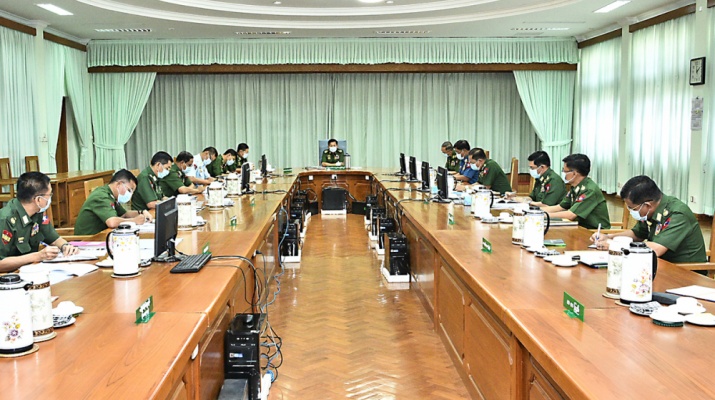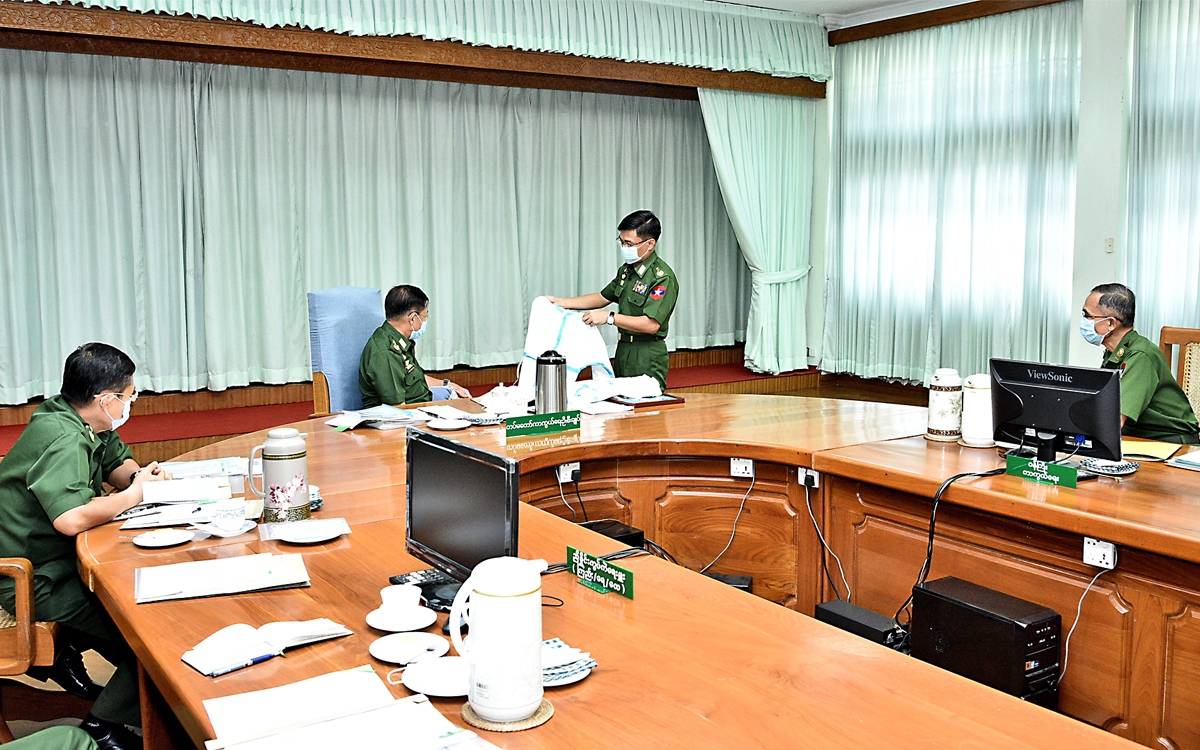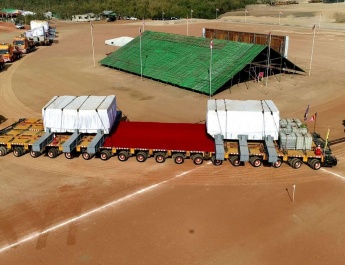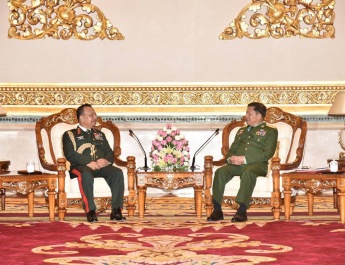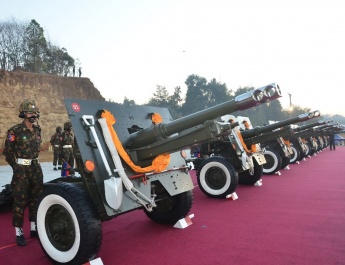Nay Pyi Taw June 3
The eighth meeting on prevention, control and treatment of COVID- 19 and fulfillment of other requirements took place at the meeting hall of the Office of the Commander-in-Chief (Army), here, this morning, presided over by Commander-in-Chief of Defence Services Senior General Min Aung Hlaing.
Present at the meeting were Commander-in-Chief of Defence Services Senior General Min Aung Hlaing, Deputy Commander-in-Chief of Defence Services Commander-in- Chief (Army) Vice-Senior General Soe Win, Chief of the General Staff (Army, Navy and Air) General Mya Tun Oo, Commander-in-Chief (Navy) Admiral Tin Aung San, Commander-in-Chief (Air) General Maung Maung Kyaw and senior military officers.
In his opening address, the Senior General said the Tatmadaw is striving for prevention of danger for lives of the citizens as much as it can. In addition to man power and material power, cash is donated to support prevention of the disease.
In donating medical protective equipment for prevention of the disease, a large number of masks have been donated. Such number of masks is lesser for the whole nation but mask is the most basic need in prevention of COVID-19. As such masks are of disposal, priority must be paid to distribution of masks to actually needy places and persons.
In taking prevention and control measures against COVID-19, needs of health readiness of the country were found. It is necessary to implement eternally proper public health system. As infection of the disease is based on world lifestyle, it is necessary to reform the lifestyle and create a clean social environment system. For example, pollution should be reduced for having clean environment and unpolluted atmosphere, and encouragement must be given for generating electricity from renewable energy such as solar, wind and hydro energy. It is necessary to encourage transportation system with the use of electricity.
The attendees to the meeting reported on efforts of region and state COVID-19 control and emergency response committees, and infection, death and recovery of the diseases across the world till today. A total of 206,183 persons were infected and 5,829 dead in India. As 31,776 persons were in positive cases in April and 153,658 in May, infection of the disease rose about five times within a month. So, India became the seventh most infected country across the world. Likewise, Bangladesh found 52,445 positive cases and 709 dead cases. A total of 7,616 positive cases were found in April and 38,915 in May, increasing more than five times. Among ASEAN countries, Singapore found 15,169 positive cases in April and 17,783 in May, Indonesia 8,441 in April and 15,992 in May and the Philippines 6,177 in April and 9,314 in May. That is why infection of the disease still increases in these countries. Infection of the disease declines in Malaysia, Thailand, Vietnam, Brunei, Cambodia and Laos.
During the 72-day period from the start of finding the virus infection, Myanmar found 233 positive cases, six dead cases and 143 recovered cases till this morning. With regard to infection at home, no positive case was found for 15 days from 18 May to 1 June. But, one more positive case of infection in the country was found on 2 June. As all the persons who returned to Myanmar by air in May were tested for virus, a total of 26 of 303 returnees from India, 13 of 591 returnees from Malaysia, eight of 148 returnees from UAE, one returnee each from Italy, China and Thailand, totally 50 were found with virus till today. There are 233 infected persons including 70 returnees from abroad and 104 persons were infected via those persons with positive cases. As such, the largest number of patients was infected by foreign returnees. It is noticeable that number of silent carrier reached 172, accounting for 73.82 percent among infected persons.
Up to now, a total of 3,437 persons were tested at military hospitals and battalions by rapid test kit, 27 at the National Health Laboratory (Yangon) by PCR system, 206 at Defence Services Medical Research Unit, 543 at No 1 Defence Services General Hospital, 27 at No 3 Military Hospital, totalling 803 by PCR system, 824 at No 1 Defence Services General Hospital by Cobas 6800 and 670 at No 2 Defence Services General Hospital, totalling 1,494 by Cobas 6800. Among them, five persons were found virus. Four of 18 officers and other ranks who came back from India to Myanmar were found positive results. They are receiving medical treatments at the Defence Services Liver
Specialist Hospital in good health conditions. Medical treatment is being provided to members of the Sangha, nuns and laypersons who returned from India at Sitagu International Buddhist Academy in Sagaing.
They then reported on two-time donations of medical equipment from one day’s salaries of Tatmadaw members and civilians appointed in Tatmadaw in May to 32 of 33 specialist hospitals, 26 of 31 general hospitals, 33 of 38 district hospitals, 241 of 270 township hospitals, 694 of 796 station hospitals and 858 of 1,949 rural health centres, five-time donations in April and May to all hospitals and 1,088 rural health centres, donations to ethnic armed organizations, provisions of medical supplies and dissemination of health knowledge in remote areas with poor transport, provisions of supplement nutritious foods 2,450 times for 148,365 patients at 440 hospitals.
They highlighted the Tatmadaw garment factories making of masks and face shields for students, production of PPE suits in accord with the international standards, revision of school lessons in respective military command areas, reading rooms and conducting of cultural courses.
Their reports focused on DHF outbreaks in neighbouring Thailand and Laos, control of and restrictions on living and eating styles during the flu season, the need to take care of living conditions as COVID-19 symptoms are similar to those of influenza, and plans to take back Myanmar citizens in Nepal facing difficulty with their return by Tatmadaw aircraft. The Senior General attended to the needs.
In his speech, the Senior General said the COVID-19 outbreak has not ceased, and infection and death rates are still increasing across the world. Not only Myanmar but also the whole world has to be struggling. The creation of job opportunities must be considered as many people face difficulties in their living conditions if they become jobless due to the pandemic.
There will be job opportunities only if there are manufacturing businesses. It is a good deed for Tatmadaw to donate medical supplies to people’s hospitals and provide supplement nutritious foods to patients. Patients and health workers alike may have difficulty with their meals. So, selling food at a fair price at crowded hospitals in regions and states will benefit patients, guests and health staff. As schools are due to open on 21 July, safe and low-cost masks should be distributed to students. Good sanitation, disinfection, vaccination, medical checkups, healthcare and health educative talks are necessary to protect schoolchildren from contracting DHF as now is the DHF season. Some symptoms of both COVID-19 and flu are similar, so educative campaigns must be launched for the public to know about this. Preparedness measures are also necessary as natural disasters may befall the country. Since COVID-19 and other diseases are seen in neighbouring countries, special care is required in the areas sharing borders with them, the Senior General said.


